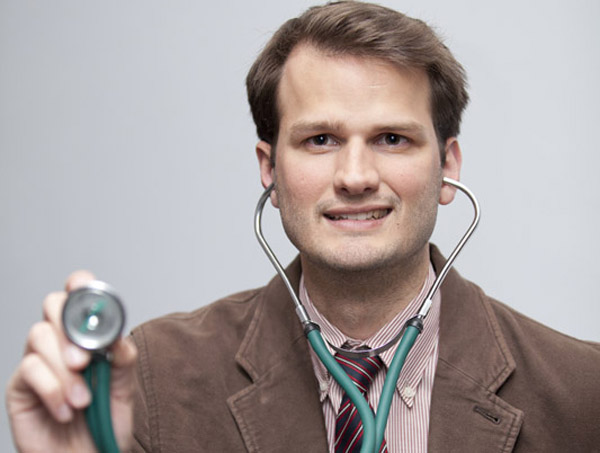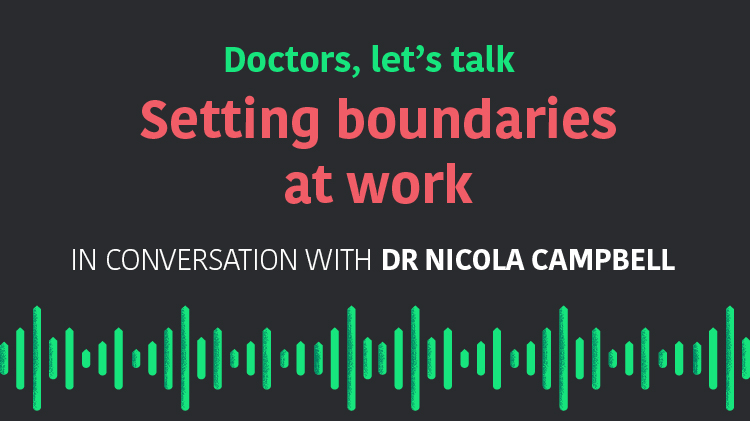You're Not Your Doctor, and I'm Not Mine
13 Jun 2016

A 26-year-old male surgical intern complaining of 5/10 peri-umbilical abdominal ache of semi-rapid onset post-bangers and mash for lunch presented to his GP… seven days later.
The episode was preceded by three to four days of rhinorrhea, sore throat and a weekend ward call shift that included assisting in a laparoscopic appendicectomy, and a severe lack of food, water, personal breaks and general sit-down time. Other associated features included feeling mildly feverish and nauseous – but no vomiting, headache, loss of appetite or changes in bowel habit, while the pain was exacerbated by lying supine, but not relieved by the usual methods.
Intern’s self-diagnosis
Naturally, the provisional diagnosis was an easy one – mesenteric adenitis on a background of recent URTI complicated by “post-ward call” syndrome, characterised by fatigue, hunger and generalised pain. After all, who would want to self-diagnose something so inconvenient as acute appendicitis, let alone in the middle of their surgical rotations and the first half of their internship?
If I confess that the eventual red flag symptoms of night-time awakening and migration of pain to the right iliac fossa did prompt me to face up to reality and seek a third-party medical opinion, perhaps you won’t deem me incompetent for being unable to diagnose my own appendicitis.
Importance of objectivity
Surely, as the ultimate curator of information about one’s own symptomatology and past medical history, an individual armed with even a bit of medical knowledge (care of Dr Google) would be best placed to make the correct diagnosis? After all, we’re all taught that “80% of diagnoses are made from taking a good history”.
Well, I learnt my lesson first-hand, and quite uncomfortably. Even armed with a medical degree and some experience dealing with the presenting complaint of interest, without the objectivity of a thorough clinical examination and judicious investigations, my interpretation of my own history for self-diagnosis was muddled by my personal conflict of interest. We may prefer to convince ourselves we are well or, in some cases, want to be unwell.
Take for example, some of the subjective “noise” experienced by the author/self-diagnostician in this instance:
- It would be too ironic to have appendicitis during a surgical rotation, not to mention the inconvenience…
- I don’t want appendicitis and definitely don’t want surgery because I like my old belly button…
Needless to say, self-examination can suffer the same fate of failing the objectivity test:
- Patient looked lousy in the mirror.
- Difficult to palpate/percuss one’s own abdomen without tensing – or was that guarding?
- Bowel sounds present – where’s the fridge?
But let’s defer commentary on the ethical, legal and professional issues of ordering tests for oneself (or relatives) and self-prescribing for another time.
Consultation and diagnosis
By this stage in my illness journey, the sensibleness of seeing my GP had triumphed. I acknowledged that my own pain and malaise was going to impede my performance and run the risk of reduced concentration, thereby impairing my ability to care for my patients – with potentially harmful consequences for both parties. A part of me did bear in mind that peritonitis secondary to a perforated viscus, such as from appendicitis, is a potentially fatal condition.
A focused, subjective history of the presenting complaint combined with knowledge of my past history and an objective clinical examination – ouch! Yes, that was guarding and rebound tenderness – by my usual GP justified the ordering of blood tests as well as abdominal ultrasound. Sure enough, there was the mesenteric adenitis I had self-diagnosed… closely related to a 15mm thick appendix and appendicolith that needed to come out.
Eight days later, minus an appendix but sporting a shiny new belly button, I was able to return to work having been cleared to perform CPR if needed – an unofficial litmus test for returning to work as a junior doctor post-abdominal surgery. However, I returned with heightened empathy for my patients, especially those with abdominal pain requiring surgery, as well as a critical lesson in seeking professional, third-party medical opinion when you’re unwell… even (and perhaps, especially) as a doctor.
Fit your own oxygen mask before tending to others
Consider this analogy and beware the temptation to neglect your own health by working yourself into the ground just to rival the ill health of your patients. We can make awful self-diagnosticians and even worse patients, and may risk our own health and wellbeing as well as that of our patients.
Please remember, doctors are only human, prone to sickness from time to time – regardless of how high or fast they ascend the hierarchy of the profession.
So if pain persists, or you experience any other constellation of signs and symptoms, please see your doctor, GP, surgeon, or call 000 rather than relying on your own conflicted and subjective self-diagnosis.
Dr Thomas Boosey
General Practice Registrar
The Alfred Hospital, Melbourne
Reportable Deaths and Coronial Matters
MDA National's Daniel Spencer (Case Manager - Solicitor) and Karen Lam (Medico-Legal Adviser) discuss when a person's death should be reported to the Coroner and what to do if the Coroner requests a statement or report.
15 May 2025
Death Certificates
When a doctor can write a death certificate (where the death does not need to be reported to the Coroner), considerations when writing the death certificate and how to complete it accurately.
15 May 2025
Communication in healthcare teams
Why good and effective communication is a vital part of delivering quality and safe patient care
15 May 2025

Doctors, Let's Talk: Setting Boundaries At Work
A conversation with Nicola Campbell, Psychiatry Registrar, that explores the necessity of setting professional boundaries as a Junior Doctor.
07 Dec 2022




